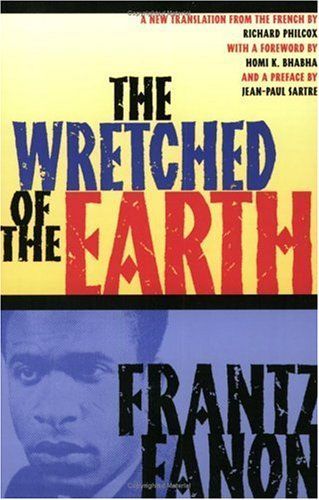
The Wretched of the Earth
A distinguished psychiatrist from Martinique who took part in the Algerian Nationalist Movement, Frantz Fanon was one of the most important theorists of revolutionary struggle, colonialism, and racial difference in history. Fanon's masterwork is a classic alongside Edward Said's Orientalism or The Autobiography of Malcolm X, and it is now available in a new translation that updates its language for a new generation of readers. The Wretched of the Earth is a brilliant analysis of the psychology of the colonized and their path to liberation. Bearing singular insight into the rage and frustration of colonized peoples, and the role of violence in effecting historical change, the book incisively attacks the twin perils of post independence colonial politics: the disenfranchisement of the masses by the elites on the one hand, and intertribal and interfaith animosities on the other. Fanon's analysis, a veritable handbook of social reorganization for leaders of emerging nations, has been reflected all too clearly in the corruption and violence that has plagued present-day Africa. The Wretched of the Earth has had a major impact on civil rights, anticolonialism, and black consciousness movements around the world, and this bold new translation by Richard Philcox reaffirms it as a landmark.
Reviews
muskaan bal@muskaankb
eris@eris
T@mateitudor
elizabeth@ekmclaren
Zack Dihel@dumb_zack
Alexander Enriquez@kgbkowboy
Ray Remnant@rayremnant
nhu ⋆𐙚₊˚⊹@nhuelle
Erich@erichrc
laia@salemrot
alexa@newjeans
Mikre @mikre
Atticus Cameron@atticspaced
Martha F.@marthaq
yasi@middleschoolbf
Aldrake @hamborger
chai@chaimyto
sky na@otterwott
Olivia@owalsh2
Hannah Swithinbank@hannahswiv
Stan D@tragikistan
emma@yeojinluvr
Amanda Sutter@duhitsamanda
Crystal L@umcrystal
Highlights
nhu ⋆𐙚₊˚⊹@nhuelle
Page 313
nhu ⋆𐙚₊˚⊹@nhuelle
Page 309
nhu ⋆𐙚₊˚⊹@nhuelle
Page 308
nhu ⋆𐙚₊˚⊹@nhuelle
Page 285
nhu ⋆𐙚₊˚⊹@nhuelle
Page 199
nhu ⋆𐙚₊˚⊹@nhuelle
Page 194
nhu ⋆𐙚₊˚⊹@nhuelle
Page 192
nhu ⋆𐙚₊˚⊹@nhuelle
Page 191
nhu ⋆𐙚₊˚⊹@nhuelle
Page 189
nhu ⋆𐙚₊˚⊹@nhuelle
Page 173
nhu ⋆𐙚₊˚⊹@nhuelle
Page 139
nhu ⋆𐙚₊˚⊹@nhuelle
nhu ⋆𐙚₊˚⊹@nhuelle
Page 109
nhu ⋆𐙚₊˚⊹@nhuelle
Page 101
nhu ⋆𐙚₊˚⊹@nhuelle
Page 99
nhu ⋆𐙚₊˚⊹@nhuelle
Page 96
nhu ⋆𐙚₊˚⊹@nhuelle
Page 94
nhu ⋆𐙚₊˚⊹@nhuelle
Page 84
nhu ⋆𐙚₊˚⊹@nhuelle
Page 70
nhu ⋆𐙚₊˚⊹@nhuelle
Page 61
nhu ⋆𐙚₊˚⊹@nhuelle
Page 54
nhu ⋆𐙚₊˚⊹@nhuelle
Page 27
nhu ⋆𐙚₊˚⊹@nhuelle
Page 26
nhu ⋆𐙚₊˚⊹@nhuelle
Page 23